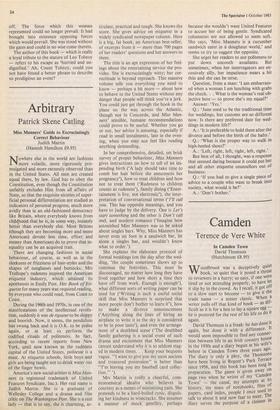Tolstoys
John Stewart Collis
The Tolstoys: Twenty-four Generations of Russian History, 1353-1983 Nikolai Tolstoy (Hamish Hamilton £12.50)
Not long ago I received a letter from Tolstoy's daughter, Alexandra. That may sound surprising. It was certainly strange to hold in my hand a letter signed by Alexandra Tolstoy who was the daughter of the author of War and Peace. But the fact is she was not born until 1884 and did not die until 1979 at the age of 95. She was the author of The Tragedy of Tolstoy which Hugh Kingsmill, amongst others, considered as one of the greatest biographies of our time. She was the only person in the family prepared to be frank regarding the struggle between her father and mother. Unfortunately in later life she mellowed, and thus became uninteresting and sentimental. On the back cover of this book the author is depicted conversing with Alexandra on her deathbed, with an expres- sion on his face as if he were smilingly con- gratulating her on recovering from a slight
chill.
Count Nikolai Tolstoy (many cousin- ships removed from the line which produc- ed Leo Tolstoy and Alexandra) was born in England. He closes his book with a frightening account of how his father, at the age of seven, evading the dreaded Cheka, escaped to England, and he ends his Preface with these words — 'But for the bravery of an English nanny and the charity of an English chaplain in 1920, I should have been born, not in happy England, but almost certainly as one of that generation of 1935 whose brief lives began and ended in socialist labour camps north of the Arctic Circle.' (How does he know that he would have been born at all? Anyway, we are delighted that his father reached England and begot him, and so this great line can continue).
He concludes his book with the exhorta- tion to his children that it will serve `to sup- ply them with that essentially noble virtue: the ability to judge an ephemeral present by the sonorous procession of a golden past.' A golden past? Count Tolstoy does not reveal it. Peering through his pages we chiefly discern the arrogance of princes, the mendacity of sycophants, the intrigues of courtiers, the misery of serfs, and endless scenes of violence, passion, cruelty, and greed. In the 17th century the line of the Tolstoys was allied with the line of the Miloslayskys whose dynastic quarrels were not excelled in savagery of slaughter till the days of Stalin. Count Tolstoy provides us with 17 varieties of Miloslayskys, and 80 (yes, 80 — see Index) varieties of Tolstoys. Seeking to impose some coherence upon
events the author includes a chapter called `The Curse of the Tsarevich,' the implica- tion being that 'the entire family was blighted by a curious malediction,' At Peter the Great's instigation the Tsarevich Alexei was secretly murdered. Facing death, the wretched young man 'cursed Tolstoy and all his house to the twenty-fifth generation.' It was very natural of him to have done so. But it is a spurious gloss to suggest that this could have had the slightest effect. However, Count Tolstoy, though often los- ing us on account of his prodigious cast with so many similar names, sometimes secures our admiration and attention, most notably when relating the murderous ac- tivities of the Miloslayskys, and when ex- posing the baseness of character and vileness of behaviour of the gifted writer Alexei Nikolaevich Tolstoy (1882-1945) who, by adapting himself to every wind that blew, lived under Stalin's regime in the ut- most luxury at the time of Russia's max- imum misery. And sometimes the author deviates into comedy when rehearsing the eccentricities of generals and admirals who, caring little for human life, lavished their affection upon bears, eagles, and orang- utans.
Count Tolstoy's chief problem is what to do about Leo — the very existence of his book being dependent upon his illustrious ancestor. Give him a chapter perhaps? Yes, he gets a chapter — a perfectly acceptable digest of what is generally know. But there is no hint of the moral giant, nothing to suggest what Thomas Mann meant when he spoke of 'the knotted muscles of Tolstoy bearing up the full burden of morality, Atlas-like.' The state of society was in- tolerable to him. And at the same time he knew himself to be a deeply flawed character; but from earliest manhood to the last month of his life he tried to be better. He was an arrogant man who strove towards humility, an unholy man who strove towards holiness, a bad man who strove to be good. No one was ever less of a hypocrite. 'The writer,' he once wrote, thinking of himself, though not quite just- ly, and less justly as the years went by, `takes out of life the best that is in it, and puts it into his work. His work is therefore beautiful and his life — bad.'
This is lost on the present author who writes about the final scene of Tolstoy's escape from his wife in the most conven- tional and thoughtless manner. There is the usual muddle as to the real contents of Tolstoy's Will, the obligatory sneer at Chertkov (his only male protector) and. disapproval of the way the Countess was prevented at Astopovo from seeing her hus- band 'for whom she had sacrificed her whole existence.' Of course, this view is more or less de rigueur in England and America since most Englishmen and all Americans are afraid of women. But the people who write in terms of poor Countess, terrible Count, have one thing in common — they never read the Diary of the Countess. From the word go, after their marriage, she reveals herself as the arch
female egotist of all time, where love is en- tirely self-love and the husband simply a possession.
She had extraordinary energy and nearly exerted complete domination over her hus- band. But not quite. The final, fatal year of their life together in 1910, ended in her defeat. The events of that year were record- ed by a cloud of witnesses at Yasnaya Polyana: by Sasha and Tanya, Birukov and Bulgakov, Kuzminski and Makovitski, Obolensky and Goldenweiser, Marya and Varvara, Vanya and Semin, Sergei and Sukotin and Sergeenko. By October she had virtually clapped him in irons and made him a prisoner in the house. But on the night of the 28th, after a scene of par- ticularly truculent behaviour, she lowered her guard and fell asleep, thus allowing him to leave the house, reach the railway sta- tion, and travel towards the scene of his death. When next morning she discovered his escape her first words were — 'When I learn where he is I will not let him escape any more. I'll watch him night and day, I'll sleep at his door!' Eventually she did discover where he was and took a special train to Astopovo. But when she got there, Tolstoy's supporters, which included some of his daughters, would not let her see him. They felt that though he was in a coma ut- tering disjointed words such as 'escape... fly... overtake' he might yet recover and live for a few years more, and they did not intend to let his wife come and finish him
off. The force which this woman represented could no longer prevail. It had brought into existence opposing forces which would prevail. She was stood without the gates and could in no wise come therein.
The author of this book — which is really a loyal tribute to the stature of Leo Tolstoy — refers to his escape as 'hurried and un- dignified.' Ah, Count Tolstoy, could you not have found a better phrase to describe so prodigious an event?







































 Previous page
Previous page